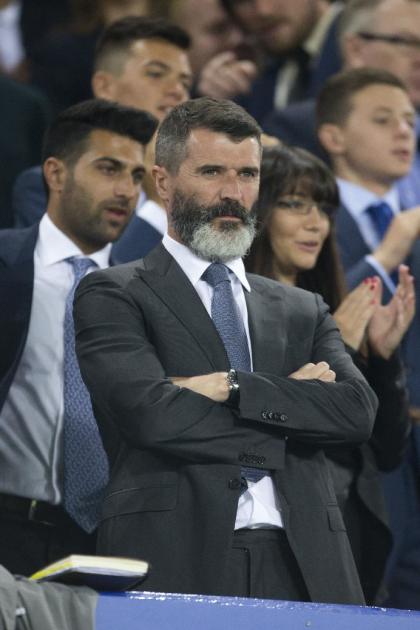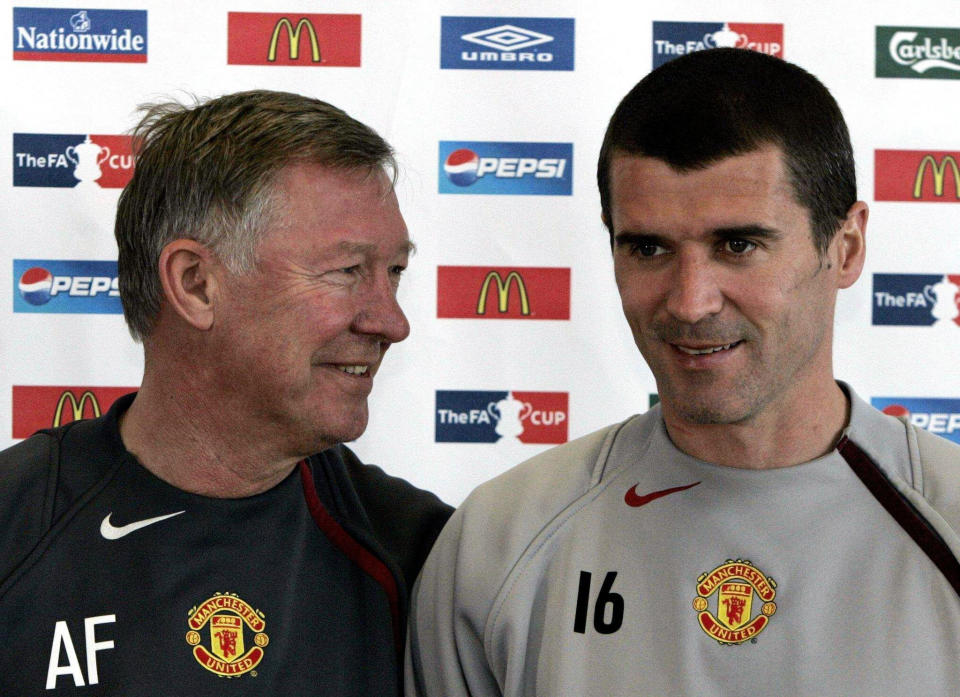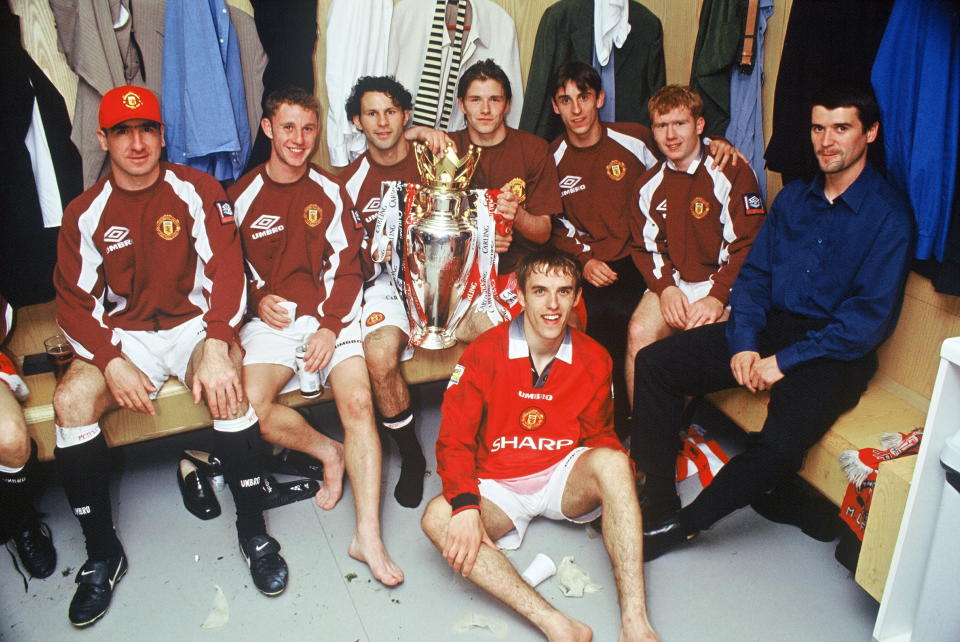Roy Keane still bitter with Sir Alex Ferguson and his Manchester United departure

MANCHESTER, England - All day the rain lashed and the wind whipped. The dark clouds hovered, ominously covering the city. Manchester. Eternal grey.
But still the crowds came in their droves. They nestled in a large, plain room awaiting the arrival of their hero. Some busied themselves with their complimentary copy of the new book, devouring as much detail as possible before the authors took to the stage. Others were at the bar, speculating. What would he say about leaving? About Sir Alex Ferguson? What would he say about himself?
At the top of the room, there were three empty chairs swathed in less-than subtle blood red lighting. It was a homecoming. Lancashire County Cricket Club played host to the Q&A but the soccer stadium - Old Trafford - is a short five-minute walk away. In the shadow of the pitch he graced so magnificently for 12 and a half years, Roy Keane was back to set the record straight. He had plenty to say. There was a new autobiography to promote and cozy anecdotes to recall. But, as always, the majority of his words were kept for Ferguson, the breakdown of the pair's relationship dissected with razor-sharp precision.

It was fascinating to witness Keane's effect on his audience. Inside the four nondescript walls, lots of middle-aged men, some sporting Roy-like shaggy, greying beards in faux tribute, hung on his every word. As he made his entrance, Keane was greeted with a standing ovation and typical soccer terrace-style oration. 'Keano! Keano! Keano!' He answered every question in great detail, spending five, sometimes 10 minutes responding. But all through there was silence from the 650-strong crowd. It was an eerie, intense focus. Keane's disciples listened as if in the presence of a preacher. As Keane, a raconteur extraordinaire when he wants to be, recounted the funny stories and gleefully hit his punch lines with perfect comedic timing, the followers erupted with laughter, sometimes with applause, too. Sometimes, in the midst of such appreciation, dedication and celebration as well as the distinct age and gender profile of the audience, another of Manchester's anti-heroes came to mind: one Steven Patrick Morrissey - the Smiths controversial lead singer.
Both are complex and contrary figures, ripe for analysis. Both suffered through acrimonious splits and have spent much of the subsequent years pointing fingers and apportioning blame. But in his latest book, Keane shoulders some responsibility, looks inward and has little difficulty in admitting when and where he made mistakes. However, he refuses to entertain the idea that his spectacular exit from Manchester United was entirely down to him, as others - namely Ferguson - have suggested.
The circumstances of his departure continue to eat away at Keane. The way in which he's been portrayed annoys him. What he perceives as Ferguson's hypocrisy riles him. The fact that so few have dared criticize his former manager angers him. But as much as he doesn't want to “play the game”, Keane is well aware of the rules. He's careful not to fly off the handle. The criticism is measured and calmly delivered. On a number of occasions, he tries to offer up a version of someone who's quite nonchalant about the whole affair. One particular diatribe begins with the killer line “David Gill (United's former chief executive who was with Ferguson at the showdown meeting in 2005 that ended in Keane's essential sacking) has a lot to answer for”. Keane then moves to dismissing Ferguson's managing of people (seen by many as his major strength) as a weakness and backs up the claim by insinuating a litany of other former United players like Ruud van Nistelrooy, David Beckham, Bryan Robson and Steve Bruce all have different views on Ferguson in private. But the barrage ends with a rather reflective “but it doesn't tarnish my time at United”.

Later, his soreness really comes to the fore. There's a genuine sensitivity and honesty when he says “They (United) should've done better with me”. For someone who made a career of honesty, hard work and dedication, Keane is bitter over how easily Ferguson and United made their minds up about him. Instead of looking to solve a problem and push through it, Keane feels United flippantly folded. But once again, there's sober reflection though it seems very much an afterthought. He warns the crowd – “Don't be going home tonight crying yourselves to sleep over it”.
The caustic stuff is saved for figures like Gill, Carlos Queiroz (United's former assistant coach) and the ex-players that are now employees of the club and part of what Keane refers to as the “propaganda”' at United. In a highly enjoyable but borderline hysterical discussion towards the end of the night, Keane says:
”United is almost like a Mafia situation – ‘You’re one of us – don’t (expletive) say anything bad about us’. It’s like Disneyland. ‘Man United Land’. (Expletive) Mickey Mouses running everywhere.”
Despite extolling the quality of United's dressing room at various times throughout the evening (“The group we had you'd want in the trenches with you”) and wistfully recalling certain players in Ferguson's mid-‘90s squad in particular (“The characters we had at United then...the best days of my life”), Keane remains fractured by what happened nine years ago. It has shrouded his opinions of the club and he wants to fire off criticisms and compliments in equal measure. He wants to show that United is a far from perfect environment and that the ugly side shouldn't be ignored. At one stage, he talks about anger:
“I think anger is a good thing. Even the kit man at United liked when I was narky before a game. At Rockmount (the Irish club where Keane started out) when I was nine or 10, I'd get angry if someone wasn't prepared. It's one of my strengths. I'd put markers down - even with the staff. Eric Harrison, who was training the youth teams, would come in to get balls signed. After a while, I had to say '(Expletive) it, Eric. Enough is enough'.”
There is a nobility to what Keane strives for - the highest of standards in everyone and everything. Some would argue it's foolish and Utopian. They'd also point to Keane's own hypocrisy in talking about standards, given some less-than pleasant moments throughout his career. But there's something quietly defiant about his unorthodox ways. Though therein lies the paradox.

Amid the differences, Keane has still ventured into TV punditry and book-writing. Though he admits he had no plans to write another autobiography, he details how he “looked at the deal, saw what was on the table - as you do”, more than hinting that the financial package was quite generous. There were also the repercussions from Ferguson's own book release last year and what Keane perceived as “lies” being peddled. So, his prime motivations were money and retaliation - hardly unorthodox. Wearily similar, in fact, to many who head down the same path. But, without the paradox, who would Keane be? Maybe, for those that love him, it makes him more real, more identifiable, imperfect like everyone else. After some questions from the room, it's time to wrap up. But Keane points to one man in the crowd and says – “This guy has had his hand up for ages”. Turns out he had driven the four hours from Glasgow to be there. Keane would've appreciated the effort.
Shortly after, the crowd were on their feet again to clap Keane off and shriek and yell and sing their appreciation.
It was fitting that on his comeback to Old Trafford, it was reassuring that Keane's performance was absorbing while his personality remains as complex as ever.
Eoin O'Callaghan is a soccer journalist and broadcaster. Best known in North America for his TV work with Fox Soccer, he has also reported extensively for BBC, RTE and Setanta Sports. He writes about soccer for The Irish Examiner newspaper, beIN Sports, One World Sports and TheScore.ie. Follow him @EoinOCallaghan



